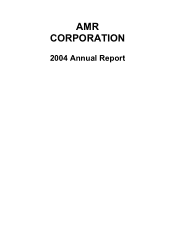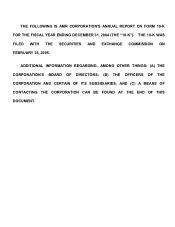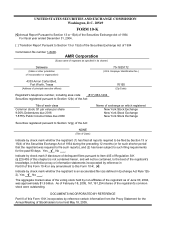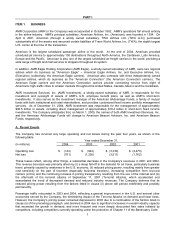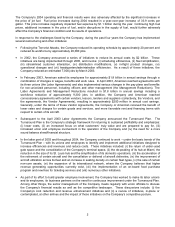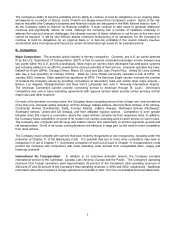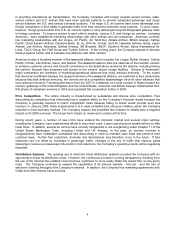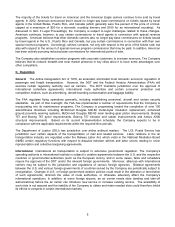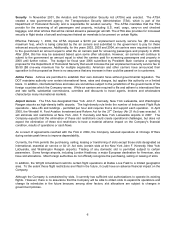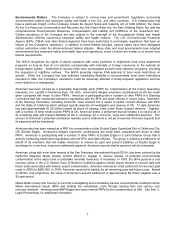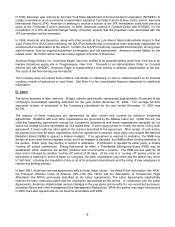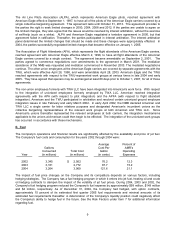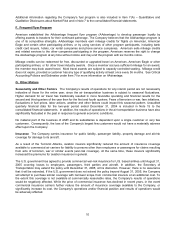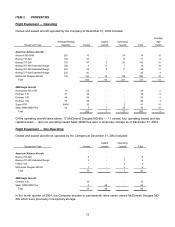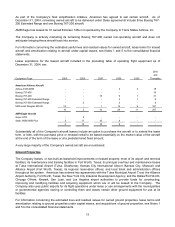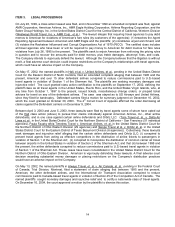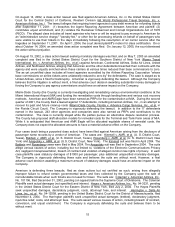American Airlines 2004 Annual Report Download - page 8
Download and view the complete annual report
Please find page 8 of the 2004 American Airlines annual report below. You can navigate through the pages in the report by either clicking on the pages listed below, or by using the keyword search tool below to find specific information within the annual report.
5
The majority of the tickets for travel on American and the American Eagle carriers continue to be sold by travel
agents. In 2002, American announced that it would no longer pay base commissions on tickets issued by travel
agents in the United States, Puerto Rico, and Canada (which generally were five percent of the price of a ticket,
capped at a maximum of $20 for a domestic roundtrip itinerary and $100 for an international roundtrip). As
discussed in Item 3 Legal Proceedings, the Company is subject to legal challenges related to these changes.
American continues, however, to pay certain commissions to travel agents in connection with special revenue
programs. American believes that other domestic carriers also no longer pay base commissions on tickets issued
by travel agents in the U.S., Puerto Rico and Canada, but pay certain commissions in connection with their own
special revenue programs. Accordingly, airlines compete, not only with respect to the price of the tickets sold, but
also with respect to the amount of special revenue program commissions that may be paid. In addition, American
has been actively pursuing reducing base commissions for international points of sale.
The Company also establishes incentive programs with corporate customers to increase revenues. The Company
believes that its network breadth and local market presence in key cities allow it to have some advantages over
other competitors.
C. Regulation
General The Airline Deregulation Act of 1978, as amended, eliminated most domestic economic regulation of
passenger and freight transportation. However, the DOT and the Federal Aviation Administration (FAA) still
exercise certain regulatory authority over air carriers. The DOT maintains jurisdiction over the approval of
international codeshare agreements, international route authorities and certain consumer protection and
competition matters, such as advertising, denied boarding compensation and baggage liability.
The FAA regulates flying operations generally, including establishing personnel, aircraft and certain security
standards. As part of that oversight, the FAA has implemented a number of requirements that the Company is
incorporating into its maintenance programs. The Company is progressing toward the completion of over 100
airworthiness directives including McDonnell Douglas MD-80 metal-mylar insulation replacement, enhanced
ground proximity warning systems, McDonnell Douglas MD-80 main landing gear piston improvements, Boeing
757 and Boeing 767 pylon improvements, Boeing 737 elevator and rudder improvements and Airbus A300
structural improvements. Based on its current implementation schedule, the Company expects to be in
compliance with the applicable requirements within the required time periods.
The Department of Justice (DOJ) has jurisdiction over airline antitrust matters. The U.S. Postal Service has
jurisdiction over certain aspects of the transportation of mail and related services. Labor relations in the air
transportation industry are regulated under the Railway Labor Act, which vests in the National Mediation Board
(NMB) certain regulatory functions with respect to disputes between airlines and labor unions relating to union
representation and collective bargaining agreements.
International International air transportation is subject to extensive government regulation. The Company's
operating authority in international markets is subject to aviation agreements between the U.S. and the respective
countries or governmental authorities (such as the European Union), and in some cases, fares and schedules
require the approval of the DOT and/or the relevant foreign governments. Moreover, alliances with international
carriers may be subject to the jurisdiction and regulations of various foreign agencies. Bilateral agreements
between the U.S. and various foreign governments of countries served by the Company are periodically subject to
renegotiation. Changes in U.S. or foreign government aviation policies could result in the alteration or termination
of such agreements, diminish the value of route authorities, or otherwise adversely affect the Company's
international operations. In addition, at some foreign airports, an air carrier needs slots (landing and take-off
authorizations) before the air carrier can introduce new service or increase existing service. The availability of
such slots is not assured and the inability of the Company to obtain and retain needed slots could therefore inhibit
its efforts to compete in certain international markets.

